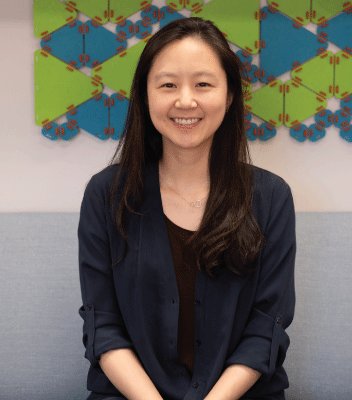2020 Janet Taylor Spence Award

Hyowon Gweon
Stanford University
Social Learning Lab
Please briefly describe your research interests.
I am interested in how we learn from others and help others learn. While humans are not the only species that engages in social learning, only humans incrementally build knowledge over generations and create cultural institutions (e.g., schools) to facilitate this process. What makes human social learning so distinctive, powerful, and effective? Our studies use a range of methods (developmental, computational, neuroimaging) to better understand the cognitive processes that support our abilities to learn from others (as learners) and help others learn (as teachers).
What was the seminal event, or series of events, that led you to an interest in your award-winning research?
My interests got shaped over a long period of time, but perhaps one of the earliest events is having spent a year abroad (actually in the Bay Area, close to where I am now) as a 10-year-old. Until then I had grown up in South Korea with no formal education in English; my brave parents put me into a 5th grade classroom with basically no preparation. Remarkably, everything still made a lot of sense, even though I couldn’t understand a word! I could still figure out what was going on in the classroom or guess what others are saying, and it turned out to be one of the most memorable, fun, and exciting periods in my childhood. Experiences like this—being transported into a different environment—can either highlight the cultural/linguistic differences or accentuate the commonalities in how the human mind works. I was fascinated more by the latter, and this was the beginning of my interest in understanding how we make sense of others’ behaviors despite different norms and conventions, and how we learn and interact with others in ways that go beyond linguistic communication.
Tell us about one of the accomplishments you are most proud of within this area of research. What factors led to your success?
It’s difficult to choose one particular paper! My hope is that one day I can look back at our projects and be genuinely proud of everything we’ve published, not just the papers themselves but also the process by which our ideas turned into those papers. It’s a tall order, but it helps me choose projects carefully and prioritize quality over quantity. And I am meta-proud about that.
One example is our latest published work (Bridgers, Jara-Ettinger, & Gweon, 2020). It’s one of the first projects we launched as I set up my own lab at Stanford, with one of my first graduate students, Sophie Bridgers. We started with a seemingly simple question: How do we know what to teach? With Julian Jara-Ettinger (Yale), we turned the question into a project that combines computational and developmental methods. We presented a computational model of how we choose what to teach and empirically tested its quantitative predictions with young children. The take-home message is that humans, even as young children, readily consider what is rewarding or difficult for someone to learn and choose to teach what maximizes the learner’s expected utilities.
What contributions, or contributors, to psychological science do you feel have had a major impact on your career path?
I have been fortunate to have wonderful mentors, colleagues, and friends who shaped my thinking as a scientist. During my training at MIT, I’ve had the luck of working with incredible scientists who are also the warmest mentors. I am especially grateful to my advisors Laura Schulz and Rebecca Saxe at MIT. Laura has the remarkable ability to identify the deepest questions from the most mundane everyday experiences, and somehow turn them into elegant, precise experiments. Rebecca’s approach to use neuroimaging to study the human mind has been a powerful force that shaped my training, and she continues to be an inspiration. While he wasn’t a formal advisor, Josh Tenenbaum (MIT) has also been an influential figure who’s always pushed me to broaden and sharpen my thinking.
After these formative years at MIT, colleagues at Stanford also had a tremendous impact on my research. Just to mention a fraction of them: Without Carol Dweck and Greg Walton, I wouldn’t have started thinking more deeply about the role of motivation and praise in social learning; Herb and Eve Clark provided thoughtful advice on how language and pragmatic understanding interact with our study designs; Mike Frank’s dedication to open science practices continues to shape my methodological approach to developmental research; Ellen Markman has been a mentor who has always been generous with her time and insightful feedback on our work.
Finally, I feel fortunate to have built a lab that I consider to be my intellectual home. I wouldn’t be where I am without these incredible people. I am particularly indebted to the inaugural members—Natalia Vélez, Sophie Bridgers, and Mika Asaba—who cultivated a lab culture that encourages social learning not just as a topic for research but as a way to do research: we take joy in learning from others and helping others learn.
What questions do you hope to tackle in the future?
We are extending our work on social learning in a few directions. First, what counts as data in learning from others? With postdoc Yang Wu, we are exploring the role of emotional expressions as information. Second, what do we learn from others? With graduate student Mika Asaba, we are investigating how children learn about the self via social learning. Third, what are children’s intuitive theories of knowledge transfer? With grad student Aaron Chuey we are beginning to tackle this question.
What does winning this award mean to you both personally and professionally?
It gives me an opportunity to look back and re-appreciate how lucky I am to have been surrounded and supported by many wonderful minds; they helped me grow as a scientist, as a mentor, and as a person. Thank you letting me express my gratitude here, in writing!

